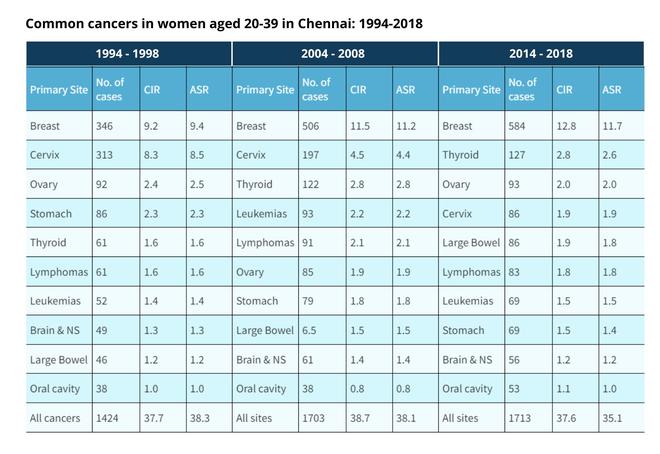There is more to a cancer diagnosis when it involves adolescents and young adults (AYA). Being in the most productive age group of 15 to 39 years, a cancer diagnosis could affect them in more than one way. For doctors in Tamil Nadu, the challenges are multifold: on one hand, the increasing incidence of cancers in this age group is a growing concern, while on the other hand are a myriad of other issues, including psychosocial impacts on patients.
I. Vijay Sundar, associate professor and neurosurgeon, Department of Surgical Oncology, Cancer Institute (WIA) lists out commonly-seen cancers in AYAs (15 to 39 years) in India. “Various types of blood cancers and brain cancers are the most common in the 15-24 age group, and cancers of the breast, thyroid, mouth and tongue constituted the leading sites between 30 and 39 years,” he said.
The overall cancer cases in the age group of 15–29 registered in five urban cancer registries in India were 5.8% of the total cancers, he said.
Srinivas Chilukuri, senior consultant, radiation oncology (paediatrics, urology and thoracic), Apollo Proton Cancer Centre, said cancers among AYAs were unique. They were often neglected, and managed by either adult oncologists (for solid tumours) in certain situations or by paediatric oncologists (for leukemias, lymphomas and brain tumours) in others.
“Historically, these cancers have shown poorer survival compared to both childhood cancers as well as adult ones. This, coupled with the increasing incidence of these cancers remain a great area of concern for the medical fraternity. The increase in the incidence has been attributed to both increased detection as well as rapidly-changing lifestyle and environmental factors,” he said. Some of these cancers are driven by adverse genetic/molecular profiles, and therefore tend to be aggressive, he added.

With data from the Madras Metropolitan Tumour Registry (MMTR) showing that there is a significant rise in oral cancers among young adult men (aged 20 to 39), R. Swaminathan, professor and head, Department of Epidemiology, Biostatistics and Cancer Registry and associate professor, Cancer Institute, said this could be attributed to the increased number of AYAs using smokeless tobacco in some form. The age of initiation is now much earlier, he said.
Challenges in diagnosis, treatment
The challenges are numerous. Dr. Sundar said symptoms are reported late by children and/or not taken seriously by the parents. “Adolescents are psychologically not completely mature at the time of diagnosis and treatment of cancers. Young adults have to bear the physical and psychological impacts of cancer and its treatment for a long period,” he said.
Dr. Chilukuri added that these cancers are often considered to be highly impactful since they affect the most productive age group; young adults in employable/marriageable/childbearing age.

The challenge is to ensure high rates of cure for these patients while ensuring their ability to be functional physically and socially, he observed. “Unfortunately, very few hospitals offer psychosocial support, reproductive counselling as well as genetic counselling for these patients which ideally should be an essential component of their care,” he added.
Divya Rajkumar, psycho-oncologist, department of psycho-oncology, Cancer Institute, said psychosocial issues among AYA cancer patients and survivors are multifaceted and can have significant impacts on their overall well-being.
The journey does not end with treatment completion, she said, adding that many continue to grapple with a myriad of psychosocial issues long after achieving remission. These may include anxiety about cancer recurrence, challenges related to fertility and reproductive health, body image concerns stemming from treatment-related changes, and navigating the financial burdens associated with cancer care.
There is a need to raise awareness about the unique needs of AYA cancer survivors and advocate for tailored support services, she said, adding: “This includes promoting open dialogues about cancer and its impact on young individuals, dispelling myths and misconceptions, and fostering supportive communities/support groups where survivors feel understood and valued.”







